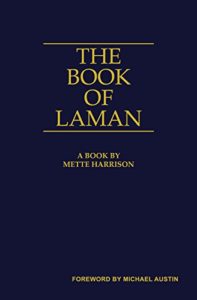 Title: The Book of Laman
Title: The Book of Laman
Author: Mette Harrison
BCC Press, 2017, 258 pages.
Genre: Historical/scripture-based novel
Reviewed by Doug Gibson, January 8, 2019
While reading “Book of Laman,” (By Common Consent Press, 2017), author Mette Ivie Harrison‘s literary take on the LDS scripture, “The Book of Mormon,” I kept thinking of Joan Osborne’s song “What If God Was One of Us.”
What if God was one of us?
Just a slob like one of us
Just a stranger on the bus
Tryin’ to make his way home?
If God had a face what would it look like?
And would you want to see if, seeing meant
That you would have to believe in things like heaven
And in Jesus and the saints, and all the prophets?
I don’t claim that this is the author’s intended theme, but to me it’s that Laman is like nearly every one of us. We’re trying to believe; that’s why we head to church once a week and read our Scriptures. But we often fight a losing battle with spirituality and godly enthusiasm when it’s stacked against frustration, grief, resentment, anger, temptation, envy, disappointment, love and hate, and even justice. OK, you’re saying Laman tried to commit murder and we don’t. But would we never think of doing that if forced to leave a comfortable home to spend a generation in the desert?
And that’s what Laman is dealing with in his book. With some literary license, Harrison paints a picture of the Jerusalem family of Lehi and Sariah as one saddled with a discredited, formerly drunk, over-zealous father who abandoned his sons and wife for a spell and is mocked for it. It’s a dysfunctional family who is then commanded by its head to leave their home.
Laman is also jealous/annoyed at his supercilious yet supremely devout younger brother, Nephi. The relationship between the two, from Laman’s perspective, is interesting. The elder brother does believe that the younger brother speaks for God, and is God’s choice to lead the exodus. The problem is Laman, and Lemuel, just can’t stand Nephi. Harrison’s portrayal of Nephi is not flattering. It reminds of the ubiquitous overzealous, condescending, condemning missionary invariably met in our tours of spiritual duty. We know they’re doing what they’re supposed to be doing but can’t they show a little humility?
“The Book of Laman” is not, as I anticipated, a satire or a polemic. It is a straightforward, at times even plodding retelling of the beginning of “The Book of Mormon.” All the major early scenes are includes, up to the arrival to the Americas and the split between the families. It concludes with a very old Laman, mostly ignored and sometimes mocked, filled with regret.
Laman’s life is a lot like our lives. He sins. He repents. He has spiritual experiences. He has dark moments of anger. He’d like to be a better person who pleases God more often.
Like “The Book of Mormon,” some characters are not developed. Lemuel is a bit of a shadowy character, who becomes more menacing as the novel progresses. Lehi and Sariah, as they age become, perhaps appropriately, less relevant. A scene with Lehi offering final blessings to his children is, however, strongly written. It captures Laman’s conflicting desires to follow Lehi’s counsel despite his anger at his brother Nephi.
Besides the conflict between Laman and Nephi, the most interest relationship is between Laman and his wife, Naomi, who share a bond and deep love. They are true confidantes. Ironically, due to their deep connection, much of Laman’s later aggressions against Nephi is supported, and even prodded, by Naomi, including the burning of a temple that prompts Nephi’s faction to leave.
Near the end of the book, Laman, begging forgiveness of God, is rewarded with a vision of Christ’s visit to his new land. Through a voice from heaven, his sins are forgiven him. Again, he’s not much different from those of us who beg God’s mercy, and ask that He forgive our sins.
